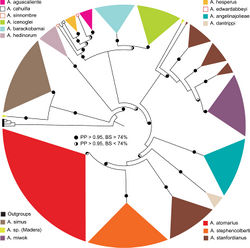Difference between revisions of "Aptostichus fisheri"
m (Imported from ZooKeys) |
m (1 revision) |
(No difference)
| |
Latest revision as of 09:53, 20 December 2012
| Notice: | This page is derived from the original publication listed below, whose author(s) should always be credited. Further contributors may edit and improve the content of this page and, consequently, need to be credited as well (see page history). Any assessment of factual correctness requires a careful review of the original article as well as of subsequent contributions.
If you are uncertain whether your planned contribution is correct or not, we suggest that you use the associated discussion page instead of editing the page directly. This page should be cited as follows (rationale):
Citation formats to copy and paste
BibTeX: @article{Bond2012ZooKeys252, RIS/ Endnote: TY - JOUR Wikipedia/ Citizendium: <ref name="Bond2012ZooKeys252">{{Citation See also the citation download page at the journal. |
Ordo: Araneae
Familia: Euctenizidae
Genus: Aptostichus
Name
Aptostichus fisheri Bond, 2012 sp. n. – Wikispecies link – Red Rock Trapdoor Spider’ ZooBank link – Pensoft Profile
Types
Male holotype (AP955) from California, Kern County, north Red Rock Canyon, 35.39752, -117.997971, 865m, coll. 30.ix-3.x.2003 and male paratype (AP954) from east Dove Spring Canyon, 35.43813, -118.046071, 1068m, coll. USGS-BRD San Diego Field Station 1.x.2003; deposited in CAS. Male paratype (AP407) from NE edge of El Paso Mountains, hills ~1.6km W HWY 395.
Etymology
The specific epithet is a patronym in honor of Robert N. Fisher of the United States Geological Survey San Diego Field Station. Specimens collected through projects directed by Dr. Fisher have greatly enhanced our knowledge of Aptostichus species distributions.
Diagnosis
Males of Aptostichus fisheri are distinguished in the diagnosis of Aptostichus bonoi.
Description of male holotype
Specimen preparation and condition. Specimen collected from pitfall trap, preserved in 80% EtOH. Coloration lightly faded. Pedipalp, leg I left side removed, stored in vial with specimen; leg II right side missing from specimen. General coloration. Carapace, chelicerae, legs dark reddish brown 5YR 3/4. Abdomen uniform light brown 7.5YR 6/3, light dorsal chevron markings (Fig. 316). Cephalothorax. Carapace 3.76 long, 3.08 wide, glabrous, stout black bristles along fringe; surface smooth, pars cephalica elevated. Fringe, posterior margin with black bristles. Foveal groove deep, strongly recurved. Eyes on low mound. AER slightly procurved, PER slightly recurved. PME, AME subequal diameter. Sternum moderately setose, STRl 2.04, STRw 1.88. Posterior sternal sigilla small, positioned away from margin but not in center, not contiguous, anterior sigilla pairs small, oval, marginal. Chelicerae with distinct anterior tooth row comprising 4 teeth, posterior margin with single row of small denticles. Palpal endites, labium, lacks cuspules, LBw 0.60, LBl 0.29. Rastellum consists of 12 stout spines not on prominent mound. Abdomen. Setose, heavy black setae intermingled with fine black setae. Legs. Leg I: 3.92, 3.44, 2.55, 1.71, 1.25; leg IV: 3.68, 2.17. Very light tarsal scopulae on legs I, II. Tarsus I with single, slightly staggered row of 9 trichobothria. Leg I spination pattern illustrated in Figures 317, 318, 320-322; TSp 13, TSr 10, TSrd 0; distinct short spines on ventral surface tarsus I. Pedipalp. Palpal tibia short, width more than half-length, with distinct patch of medial/distal retrolateral spines (Fig. 319). Palpal bulb short; embolus stout, dorsal-ventrally flattened with slight curvature at its midpoint, serrated distally (Fig. 322). PTw 0.77, PTl 1.30, Bl 0.65.
Variation (3). Cl 3.72-4.12, 3.87±0.13; Cw 3.01-3.48, 3.19±0.15; STRl 2.00-2.18, 2.07±0.05; STRw 1.84-1.98, 1.90±0.04; LBw 0.56-0.68, 0.61±0.04; LBl 0.29-0.37, 0.32±0.03; leg I: 3.92-4.35, 4.06±0.14; 3.29-3.60, 3.44±0.09; 2.35-2.63, 2.51±0.08; 1.64-1.75, 1.70±0.03; 1.20-1.25, 1.23±0.02; leg IV: 3.56-4.08, 3.77±0.16; 2.17-2.36, 2.23±0.06; PTl 1.30-1.36, 1.32±0.02; PTw 0.71-0.77, 0.75±0.02; Bl 0.58-0.68, 0.64±0.03; TSp 13-21, 16.00±2.52; TSr 10-11, 10.33±0.33; TSrd 0-0, 0±0.
Description of female
Known only from male specimens.
Material examined
Known only from the type material.
Distribution and natural history
Aptostichus fisheri is narrowly restricted to high altitude Mojave Desert habitat in Kern County. Males appear to disperse during the fall months of September and October.
Species concept applied
Morphological.
Conservation status
The conservation status of Aptostichus fisheri is likely imperiled given its very restricted distribution.
Original Description
- Bond, J; 2012: Phylogenetic treatment and taxonomic revision of the trapdoor spider genus Aptostichus Simon (Araneae, Mygalomorphae, Euctenizidae) ZooKeys, 252: 1-209. doi
Images
|

![Figures 316–322. Aptostichus fisheri sp. n. from Kern County; scale bars = 1.0mm. 316 habitus of male paratype (AP954) [806438] 317–319 male holotype (AP955) 317 retrolateral aspect, leg I [806442] 318 prolateral aspect, leg I [806446] 319 retrolateral aspect, pedipalp [806448] 320, 321 male paratype (AP407) 320 retrolateral aspect, leg I [806450] 321 prolateral aspect, leg I [806454] 322 line drawings of leg I spination pattern and pedipalp; retrolateral aspect, patella, tibia, metatarsus, tarsus; prolateral aspect, tibia and patella; retrolateral aspect, pedipalp.](https://species-id.net/o/thumb.php?f=ZooKeys-252-001-g082.jpg&width=204)